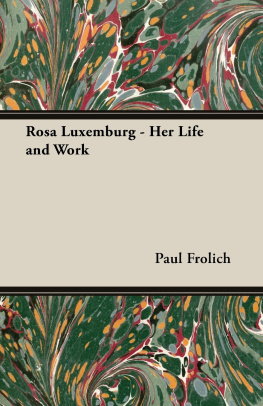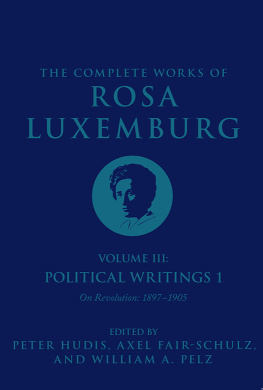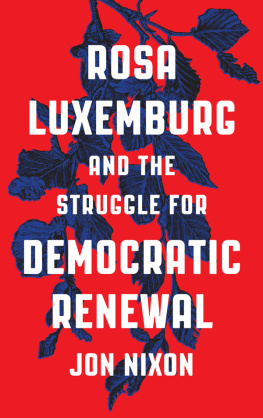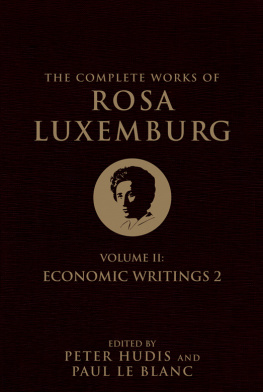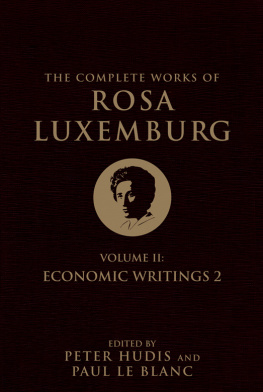Paul Frölich - Rosa Luxembourg
Here you can read online Paul Frölich - Rosa Luxembourg full text of the book (entire story) in english for free. Download pdf and epub, get meaning, cover and reviews about this ebook. year: 2010, publisher: Haymarket, genre: Politics. Description of the work, (preface) as well as reviews are available. Best literature library LitArk.com created for fans of good reading and offers a wide selection of genres:
Romance novel
Science fiction
Adventure
Detective
Science
History
Home and family
Prose
Art
Politics
Computer
Non-fiction
Religion
Business
Children
Humor
Choose a favorite category and find really read worthwhile books. Enjoy immersion in the world of imagination, feel the emotions of the characters or learn something new for yourself, make an fascinating discovery.
- Book:Rosa Luxembourg
- Author:
- Publisher:Haymarket
- Genre:
- Year:2010
- Rating:4 / 5
- Favourites:Add to favourites
- Your mark:
- 80
- 1
- 2
- 3
- 4
- 5
Rosa Luxembourg: summary, description and annotation
We offer to read an annotation, description, summary or preface (depends on what the author of the book "Rosa Luxembourg" wrote himself). If you haven't found the necessary information about the book — write in the comments, we will try to find it.
Rosa Luxembourg — read online for free the complete book (whole text) full work
Below is the text of the book, divided by pages. System saving the place of the last page read, allows you to conveniently read the book "Rosa Luxembourg" online for free, without having to search again every time where you left off. Put a bookmark, and you can go to the page where you finished reading at any time.
Font size:
Interval:
Bookmark:
First published in Paris In August 1939.
Published in English by the Left Book Club in London in 1940.
This translation first published in 1972 Pluto Press.
This edition published in 2010 by Haymarket Books
P.O. Box 180165
Chicago, IL 60618
773-583-7884
info@haymarketbooks.org
www.haymarketbooks.org
Trade distribution:
In the U.S., Consortium Book Sales and Distribution,
In Canada, Publishers Group Canada,
In the UK, Turnaround Publisher Services,
In Australia, Palgrave Macmillan,
All other countries, Publishers Group Worldwide,
ISBN: 978-1-60846-074-8
Cover design by Josh On and Melanie Cervantes.
Cover image by Melanie Cervantes.
Special discounts are available for bulk purchases by organizations and institutions.
Please contact Haymarket Books for more information at 773-583-7884 or .
This book was published with the generous support of Lannan Foundation and the Wallace Action Fund.
Library of Congress CIP Data is available.
This translation is based on the 3rd revised German edition of Paul Frolichs Rosa Luxemburg. Gedanke und Tat, which was published in Frankfurt am Main in 1967. It leans heavily on Edward Fitzgeralds translation which was published by Victor Gollancz, in a Left Book Club Edition, in 1940. For reasons associated with the conditions under which this earlier English translation was produced-in slightly abridged form without the author having access to the original source material-the authors widow Rose Frolich felt that a new definitive edition of the work should appear in English, a thorough re-translation, incorporating all the revisions and changes of the 3rd German edition.
Information which appears in square brackets has been added by the translator to elucidate the text. Material in round brackets generally occurs in the German original. Footnotes are taken from the German edition except where otherwise indicated.
A number of abbreviations have been used throughout the text and they are appended here with full English titles for the convenience of the reader:
| The Bund | Jewish Workers League (Algemener Yiddisher Arbeter Bund) |
| PPS | Polish Socialist Party |
| SDKPiL | Social Democratic Party of the Kingdom of Poland and Lithuania |
| SPD | Social Democratic Party of Germany |
| USPD | Independent Social Democratic Party of Germany |
| KPD | Communist Party of Germany |
It has been a great honour to be asked by Rose Frolich, the widow of Paul Frolich, to write an introduction to the present edition of Rosa Luxemburg. It is good to have a new and fuller edition of a magnificent book, which has been a rarity for a whole generation.
Frolichs book is written in the spirit of its heroine. Frolich shows clearly that above all Rosa Luxemburg was a giant of thought and action; she dared to think because she dared to act; her will matched her reason.
Franz Mehring, the biographer of Marx, did not exaggerate when he called Rosa Luxemburg the best brain after Marx. But she did not contribute her brain alone to the working-class movement; she gave everything she had-her heart, her passion, her strong will, her very life.
Above all else, Rosa Luxemburg was a revolutionary socialist, and among the great revolutionary socialist leaders and teachers she has a special historical place of her own.
When reformism degraded the socialist movements by aspiring purely for the welfare state, by tinkering with capitalism, it became of first importance to make a revolutionary criticism of this handmaiden of capitalism. It is true that other Marxists besides Rosa LuxemburgLenin, Trotsky, Bukharin and othersconducted a revolutionary fight against reformism. But they had a limited front to fight against. In their country, Russia, the roots of this weed were so weak and thin, that a mere tug was sufficient to uproot it. Where Siberia or the gallows stared every socialist or democrat in the face, who in principle could oppose the use of violence by the labour movement? Who in Tsarist Russia would have dreamed of a parliamentary road to socialism? Who could advocate a policy of coalition government, for with whom could coalitions be made? Where trade unions scarcely existed, who could think of considering them the panacea of the labour movement? Lenin, Trotsky and the other Russian Bolshevik leaders did not need to counter the arguments of reformism with a painstaking and exact analysis. All they needed was a broom to sweep it onto the dungheap of history.
In Central and Western Europe conservative reformism had much deeper roots, a much more embracing influence on the thoughts and moods of the workers. The arguments of the reformists had to be answered by superior ones, and here Rosa Luxemburg excelled. In these countries her scalpel was a much more powerful weapon than Lenins sledgehammer.
In Tsarist Russia the mass of the workers were not organised in parties or trade unions. There was no great threat of powerful empires being built by a bureaucracy rising from the working class as in the well-organised workers movement of Germany; and it was natural that Rosa Luxemburg had a much earlier and clearer view of the role of the labour bureaucracy than Lenin or Trotsky. She understood long before they did that the only power that could break through bureaucratic chains is the initiative of the workers. Her writings on this subject can still serve as an inspiration to workers in the advanced industrial countries, and are a more valuable contribution to the struggle to liberate the workers from the pernicious ideology of bourgeois reformism than those of any other Marxist.
Rosa Luxemburgs blend of revolutionary spirit and dear understanding of the nature of the labour movement in Western and Central Europe is in some way connected with her particular background of birth in the Tsarist Empire, long residence in Germany, and full activity in both the Polish and the German labour movements. Anyone of smaller stature would have been assimilated into one of the two environments, but not Rosa Luxemburg. To Germany she brought the Russian spirit, the spirit of revolutionary action. To Poland and Russia she brought the Western spirit of workers self-reliance, democracy and self-emancipation.
Her Accumulation of Capital is an invaluable contribution to Marxism. In dealing with the mutual relations between the industrially advanced countries and the backward agrarian ones she brought out the most important idea that imperialism, while stabilising capitalism over a long period, at the same time threatens to bury humanity under its ruins.
Being vital, energetic and non-fatalistic in her approach to history, which she conceived of as the fruit of human activity, and at the same time laying bare the deep contradictions of capitalism, Rosa Luxemburg did not consider that the victory of socialism was inevitable. Capitalism she thought, could be either the prelude to socialism or the brink of barbarism.
A passion for truth made Rosa Luxemburg recoil from any dogmatic thought. Nothing was more intolerable to her than bowing down to infallible authorities. As a real disciple of Marx she was able to think and act independently of her master. Though grasping the spirit of his teaching, she did not lose her critical faculties in a simple repetition of his words, whether these fitted the changed situation or not, whether they were right or wrong. Rosa Luxemburgs independence of thought is the greatest inspiration to socialists everywhere and always.
During a period when so many who consider themselves Marxists sap Marxism of its deep humanistic content, no one can do more to release us from the chains of lifeless mechanistic materialism than Rosa Luxemburg. For Marx communism (or socialism) was real humanism, a society in which the full and free development of every individual is the ruling principle. (
Font size:
Interval:
Bookmark:
Similar books «Rosa Luxembourg»
Look at similar books to Rosa Luxembourg. We have selected literature similar in name and meaning in the hope of providing readers with more options to find new, interesting, not yet read works.
Discussion, reviews of the book Rosa Luxembourg and just readers' own opinions. Leave your comments, write what you think about the work, its meaning or the main characters. Specify what exactly you liked and what you didn't like, and why you think so.


